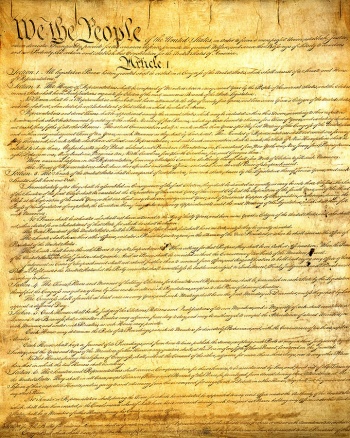Portal:Liberty and Constitution
Liberty and Constitution
|
America became a federal republic in 1789 when the Constitution was ratified. If you grew up in America, you were likely taught that America is a 'democracy'. 'The majority rules' was a referee we turned to on the playground and much of daily life, but we knew instinctively that majority rule had it's limitations, that the majority could not require one to submit to something unfair - though 'rule of law' would have been a foreign and abstract concept on the playground. America is democratic - a good thing. Government needs the input of the people and must be answerable to them. To the extent that it turns away from that it becomes autocratic.
The US is a constitutional, federal republic governed by officials that are democratically elected, which makes a democratic process essential. America was not the first constitutional republic, but it was quite new in important ways. Like England it rested on constitutional rule of law. To this it added sovereignty of its member states who ceded only necessary powers to the federation. (It was a federal nation entered into voluntarily by a group of existing sovereign states. The United States would not have been formed if its founding document The Constitution had not recognized individual State sovereignty and left to the states all powers not specified in the Constitution.) They laid out a very careful separation of those powers between the several branches of federal government to guard against abuses that would follow if concentration of power were allowed. The Americans of the time drew on examples that came before and on a variety of liberal thought that had existed in Europe (going back to Aristotle) and in America. It drew on the English examples of constitutional monarchy, the English Constitution, and Common Law and added the lessons of the colonial American experience. It drew heavily on the fact that the individual states would not agree to federalism unless they retained a high degree of sovereignty. Indeed, there was a prolonged debate carried out in the newspapers of the time between the Federalists and the Anti-Federalists about the desirability of the states to cede any powers. America was in a unique position - having an unusual collection of very agile and educated intellects (Jefferson, Adams, Franklin, Hamilton, Jay, Madison, Otis, Paine, Washington and others), a history of previous examples to inform them, the recent history of events in America and England, and a blank (well, almost blank) page to write on. Perfection can't be achieved in such a complex endeavor involving so many interests, but it was the most perfect such union ever created - by whatever measure you wish to pick. Articles for this categoryCandidate topics for articles:
There is some overlap between this and other categories, such as American Independence.
What makes the subjects of this category worth writing about is that America has been so successful for so long - due in large part to the work of those who wrote and ratified our Constitution. In today's environment of deep political divisions, it may help to remind ourselves of our beginnings and the problems and issues that our founders struggled with. They were not entirely different than the problems and issues we deal with today.
|
Topic/Category treeClick on arrows to see subcategories and articles. Things you can do
|
Featured ArticleThe Founders and their Purpose |
